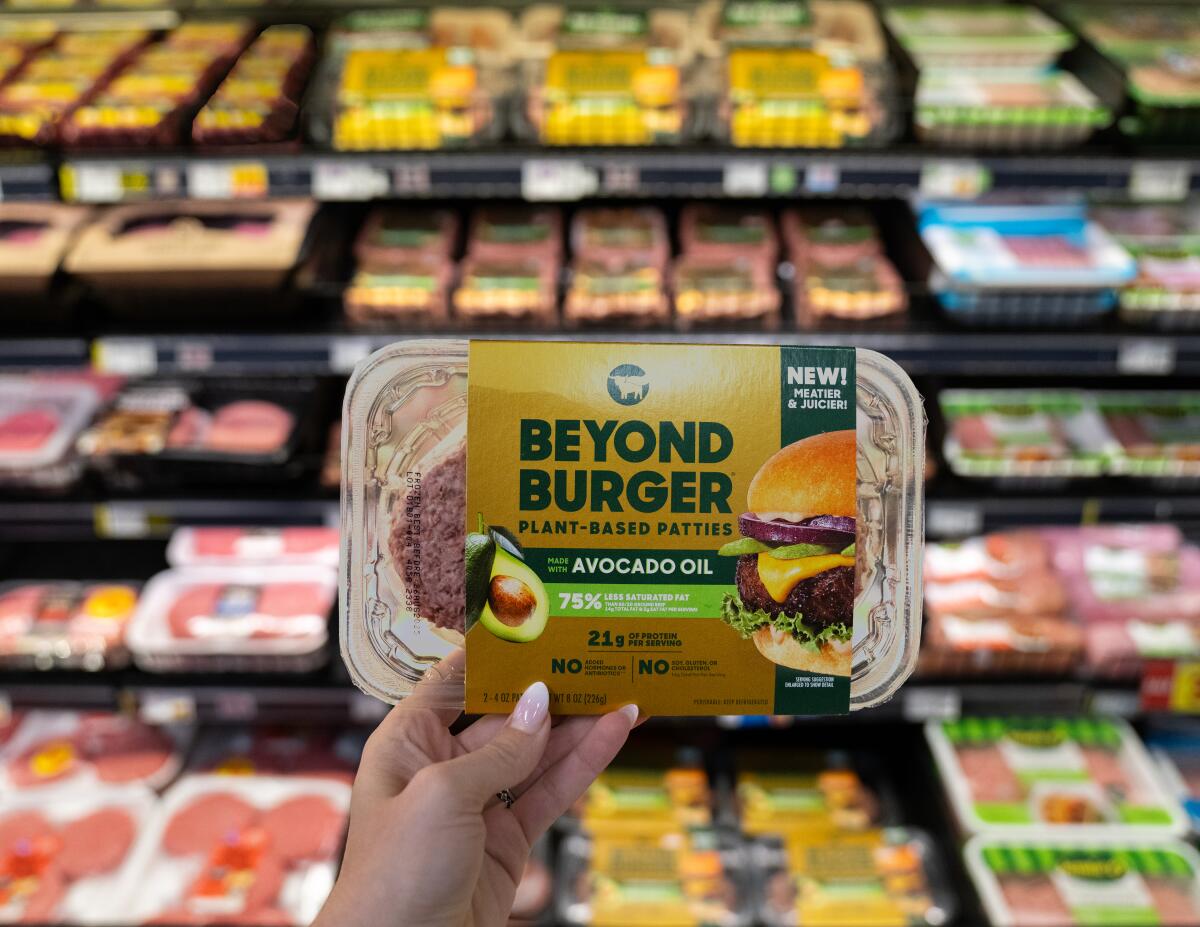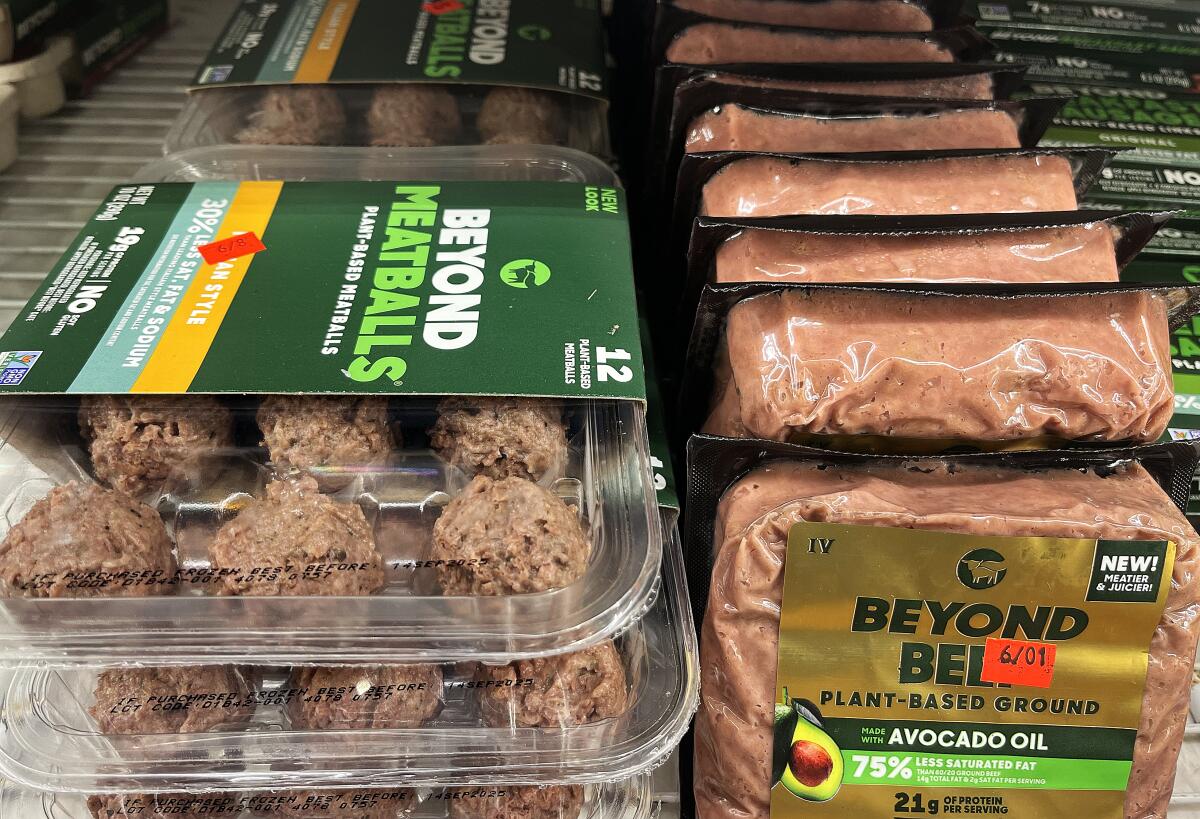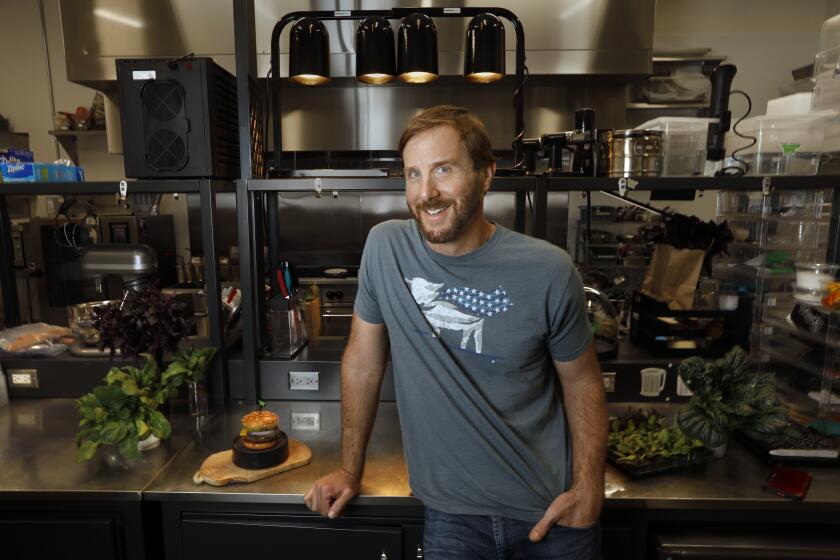How Beyond Meat is trying to get its sizzle back

- Share via
When Beyond Meat went public in 2019 in an initial stock offering that saw its shares nearly triple in price, it seemed to confirm that plant-based meats had arrived.
The food technology, capable of converting beans into something approaching meat in taste and appearance, caught the imagination of the public, restaurant chefs and media alike. Deals with fast-food chains and soaring sales during the COVID-19 pandemic seemed to only underscore how a once-fringe idea had gone mainstream.
But those heady days are over as industry sales have fallen amid concerns about the healthfulness of plant-based meat, a sticker price that remains higher than a basic burger — and the fact that the product still only approximates the real thing.
Beyond Meat is changing the way people eat. Can it live up to its founder’s wildest dreams?
“We thought we were just gonna go from our meteoric rise into the mainstream and not have to deal with this cycle that we’re in,” said Beyond Meat founder and Chief Executive Ethan Brown in an interview at the company’s new El Segundo offices. “The trough has been a difficult place to be the last couple of years.”

Now the company is betting it can turn around its fortunes with a newly formulated burger that it says not only is a big leap in taste, but has won the seals of approval of leading health and nutrition organizations.
“I give credit where it’s due. I think they’ve made some clear improvements in the ingredients and nutritional profile, so there’s clear progress there,” said John Baumgartner, an analyst at Mizuho Securities who has had an “underweight” rating on Beyond’s stock.
As the first plant-based meat company to go public, Beyond has been an industry bellwether, with its travails documented in the media and regulatory filings.
Though the company’s growing lineup, including breakfast patties, beef tips and chicken tenders, are sold at 130,000 retail and food service outlets worldwide, some of its heralded fast-food deals with companies such as Carl’s Jr., Dunkin Donuts and KFC have either petered out or not moved beyond test phases.
It’s also faced stiff competition from chief rival, Impossible Foods in Redwood City, Calif., which has made fast sales gains at supermarkets and is available as a Whopper at Burger King.
Beyond’s net revenue fell by more than 25% to $343 million in 2023 compared with 2021. Sales decreased an additional 18% in the first quarter of this year, with the company racking up $54 million in losses.
With numbers like that, investors have taken a beating. The stock is down more than 90% since its all-time highs topping $200 in 2019. Shares closed Friday at $7.59.

The sales decline has taken a sharp financial toll, with the company’s cash position falling from $733 million in 2021 to $190 million last year.
That prompted TD Cowen in a May earnings note to say the company may run out of money if it can’t stem the bleeding or raise funds — an outcome Brown dismisses. In Beyond’s quarterly conference call, the chief financial officer talked about raising funds through either debt or equity.
“It’s challenging,” Baumgartner said. “The category is still trying to find its way.”
Sales of plant-based meats and seafood were down 12% in 2023 to $1.2 billion, with unit sales falling even more by 19%, according to the Good Food Institute.
While the novelty of plant-based meat has worn off, what has stuck are persistent cries of “fake” or “faux” meat by critics — a diverse group that includes nutritionists, the entrenched meat industry and whole food absolutists who proselytize eating foods closer to nature.
The meat industry has for years helped bankroll a campaign highlighting the highly processed nature of Beyond’s and other makers’ plant-based beef products. “Fake meat, real chemicals,” is one such campaign sponsored by the Center for Consumer Freedom, a business-backed nonprofit.
“Our campaign simply informed the public about what’s in fake meat. Consumers have seen past the marketing spin and realized that these products are just ultraprocessed goop that costs more and isn’t healthier than real meat,” James Bowers, executive director of the center, said in an emailed statement to The Times.
Beyond has tried to stress that all its ingredients come from plant-based sources, but there are many nutritionists on the web who also have voiced concerns about the fat and sodium content of the older burgers — and an industrial process that creates a product Grandma would not have stocked in her kitchen.

Baumgartner thinks those voices have resonated more than any industry-backed campaign.
Brown maintains entrenched food lobbies are the real culprit, while also acknowledging their effectiveness.
“So if you look at 2020, 50% or more of consumers thought that plant-based meat was healthy. That dropped to 38% in 2022. And it’s probably lower today,” he told The Times.
Beyond is banking its turnaround on the fourth iteration of its burger meat, which began wide distribution in May. Beyond has switched from canola and coconut oils to avocado oil, reducing saturated fat by 60% to 2 grams per serving, while cutting sodium by 20%.
Brown said the new recipe, which includes peas, red lentils, faba beans and brown rice, was developed through consultation with the company’s scientific and nutritional advisors, as well as leading health groups.
The new burger has earned key endorsements by the American Diabetes Assn. and Good Housekeeping that Beyond plans to slap on its labeling. The American Heart Assn. is including the product in its heart-healthy recipe collection.
Beyond also says its major recipe change has resulted in its “meatiest, juiciest” burger ever, citing early taste tests to back up its claim. That’s an important consideration, given the competition.
Impossible Foods, founded by a Stanford University biochemist, makes soy-based burgers, using a bean that has been manipulated by the food industry for decades to make an assortment of products. The company’s burgers also contain a genetically modified plant-based version of heme, an iron-containing molecule that is a component of beef.
In online taste tests, Impossible often beat Beyond’s burgers, which are based on peas. Brown chose peas because of alleged health concerns over soy-based products, the vast majority of which are genetically modified.
Impossible’s burgers became the darlings of foodies and chefs at high-end restaurants before the pandemic, and since then, like Beyond, the company has continued to improve them, with multiple versions now available.
Though both companies laid off workers amid the industry’s downturn, Impossible has seen strong retail sales and claims it is “the fastest-growing meat from plants brand” in the country. It’s also managed to make its Impossible Whopper stick on Burger King’s menus. As a privately held company, it does not release detailed financial information.
Overseas, Beyond, which can market its product as non-GMO, sells in far more countries, and, though McDonald’s decided against selling a Beyond-based burger in the United States, it does so in Europe.
Despite how much is riding on its newest burger, Beyond has raised the suggested retail price for an eight-ounce pack of two patties by one dollar to $6.99, partly to offset the higher costs of the ingredients, but also to improve margins.
Baumgartner questioned the move, especially after Beyond had discounted the price of its previous burger.
“I think what complicates the matter now is in 2023, when you had inflation and you were seeing food prices going up, Beyond cut their prices. Now, as prices have generally stabilized, Beyond Meat is raising prices.”
Brown dismissed the concerns, saying the company needs to raise its margins after the previous price cut destroyed them, while doing nothing to improve sales.
Though Brown’s goal has been to achieve pricing parity with animal meat, he said Beyond’s customers — health-conscious and concerned about the environmental issues surrounding the beef industry — have been found to be “price-insensitive.”
The fundamental challenge for Beyond, he said, is turning around the wider perception that its plant-based meat is not good for you.
“Once that narrative became complicated for people because of misinformation or whatever, it became harder to grow the business. We have addressed that thoroughly in this product,” he said.
More to Read
Inside the business of entertainment
The Wide Shot brings you news, analysis and insights on everything from streaming wars to production — and what it all means for the future.
You may occasionally receive promotional content from the Los Angeles Times.












